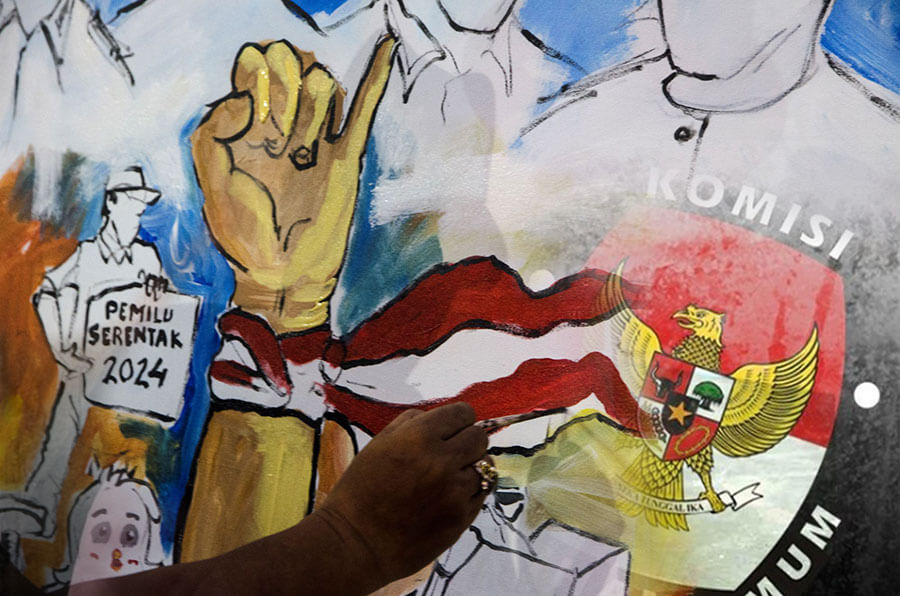2024: Indonesian Election Geopolitics is in a State of Alert

The decision of the Constitutional Court (MK) to grant the request for judicial review of Article 169 point q of Law 7/2017 concerning Elections, which sets the minimum age limit for presidential and vice presidential candidates at 40 years, has significant geopolitical implications. Geopolitically, this decision influences political dynamics in Indonesia and has the potential to have long-term impacts.
This decision could also affect Indonesia’s relations with other countries. In geopolitics, leadership and political stability in a country can influence bilateral and regional relations. With the change in the age requirements for presidential and vice presidential candidates, many of Indonesia’s partner countries are responding to how this change can affect cooperation and mutual interests. In a geopolitical context, this can create a shift in the dynamics of regional diplomacy.
At the same time, changes in age requirements can affect Indonesia’s image in the eyes of the world. A country’s image, in geopolitics, can influence international support, investment, and trade relations. So it is clear that this decision will strengthen or weaken Indonesia’s political image in the eyes of foreign countries, depending on the extent to which geopolitical relations influence it.
The problem is that changes in the age requirements for presidential and vice presidential candidates can influence Indonesia’s policy as well. The new leadership that emerges as a result of these changes could bring changes in Indonesia’s policy approach and priorities. This could impact geopolitical issues, such as relations with regional neighbors, participation in international organizations, and Indonesia’s position in regional conflicts.
Thus, this MK decision, in a geopolitical context, has a broad impact on the dynamics of Indonesian politics, diplomacy and policy. This can create uncertainty and shifts in geopolitical relations in the Southeast Asia region and may require attention from global geopolitical actors.
In addition, leadership in Indonesia, in recent days, has increasingly become a national theme as part of the 2024 elections. This has a significant geopolitical impact considering Indonesia’s position as the largest country in Southeast Asia. As a key player in the region, the results of the 2024 elections could influence Indonesia’s geopolitical relations with neighboring countries and global players.
The General Election Commission (KPU) has issued PKPU number 19 of 2023 concerning Registration of Presidential and Vice Presidential Candidates for the 2024 Election. In this PKPU, registration is open from 19 to 25 October 2023. So in about a week, Indonesia and the international world will know who is who. alone will be the presidential and vice presidential candidates in the 2024 democratic election, and this will influence geopolitical dynamics in the Southeast Asia region and at the global level.
The decision on who will be the presidential and vice presidential candidates will have major implications in the regional geopolitical context, especially in terms of economic and political cooperation with neighboring countries and international partners. In the context of the 2024 Election, understanding Indonesia’s geopolitics which is in a state of alert becomes increasingly important, in line with the principles of the ideology of Pancasila.
It must also be understood that there are times when general elections are often the target of the outsiders’ influence, including attempts to intervene in the election process. This kind of influence can have a negative impact on Indonesia’s sovereignty and policy. At the same time, it often creates security challenges, including the potential for election-related riots or conflicts.
Then also controversial or disputed election results can create uncertainty in geopolitics. This uncertainty could affect relations with other countries and Indonesia’s own policy. All of this can affect geopolitical stability and relations with neighboring countries.
As an archipelagic country with a strategic location, Indonesia must face a number of challenges that can impact stability and security in the region, and within the Pancasila framework, maintaining the unity and integrity of the country is the main principle. The elected leader will be faced with the important task of carrying out smart diplomacy, creating strong maritime security, and promoting regional collaboration in the spirit of mutual cooperation and unity, which are the values of Pancasila.
This effort is a key step in safeguarding national interests, as well as strengthening the country’s important role in global geopolitics, while integrating Pancasila principles in its relations with foreign countries. With ever-changing geopolitical dynamics, wise policy and effective strategies, which are in line with the values of Pancasila, become a vital foundation for facing these complex challenges in the future.
In view of the Pancasila ideology, understanding geopolitical challenges and opportunities is very important, because this ideology underlines principles such as sovereignty, deliberation and social justice. Pancasila, as the basic ideology and philosophy of the Indonesia, plays an important role in guiding the country’s geopolitical approach in facing challenges and opportunities at regional and global levels.
Therefore, the 2024 election is an important moment in seeing how the Pancasila ideology, as the basis of the Indonesian state and philosophy, plays a role in shaping this country’s geopolitical approach in facing challenges and opportunities at regional and global levels. The principles of sovereignty and social justice contained in the first two principles of Pancasila, emphasize the importance of maintaining Indonesia’s territorial integrity and natural resources.
Indonesia, as a democratic country, faces a number of complex geopolitical challenges in the period leading up to the general election. Indonesian geopolitics in the context of general elections has a significant impact on the direction of policy and international relations. In a geopolitical context, this means that Indonesia must be vigilant.
(Prof. Dr. Ermaya Suradinata, SH, MH, MS, is the former Director General of Social and Political Affairs of the Indonesian Ministry of Home Affairs, Chancellor of IPDN, and former Governor of Lemhannas RI.)
